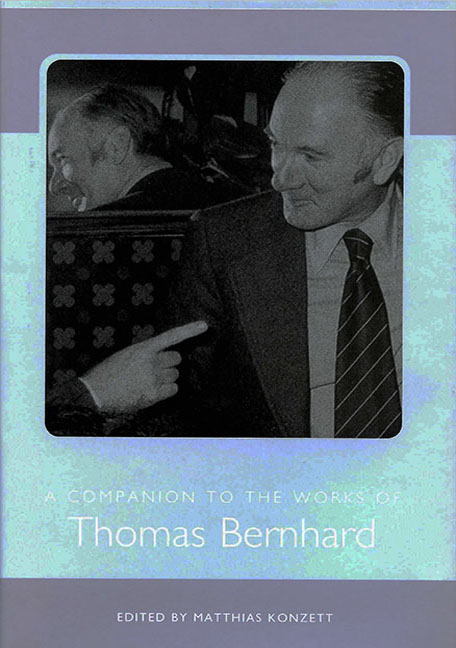Book contents
- Frontmatter
- Contents
- Acknowledgments
- Abbreviations
- Bernhard in the Public
- Bernhard's Poetics
- Bernhard and Drama
- Bernhard's Social Worlds
- Language Speaks. Anglo-Bernhard: Thomas Bernhard in Translation
- Ungleichzeitigkeiten: Class Relationships in Bernhard's Fiction
- Thomas Bernhard's Der Untergeher: Newtonian Realities and Deterministic Chaos
- My Latest Encounter with Bernhard
- Works Cited
- Notes on the Contributors
- Index
Thomas Bernhard's Der Untergeher: Newtonian Realities and Deterministic Chaos
from Bernhard's Social Worlds
Published online by Cambridge University Press: 28 April 2017
- Frontmatter
- Contents
- Acknowledgments
- Abbreviations
- Bernhard in the Public
- Bernhard's Poetics
- Bernhard and Drama
- Bernhard's Social Worlds
- Language Speaks. Anglo-Bernhard: Thomas Bernhard in Translation
- Ungleichzeitigkeiten: Class Relationships in Bernhard's Fiction
- Thomas Bernhard's Der Untergeher: Newtonian Realities and Deterministic Chaos
- My Latest Encounter with Bernhard
- Works Cited
- Notes on the Contributors
- Index
Summary
Wertheimer war nicht imstande, sich selbst als ein Einmaliges zu sehen, wie es sich jeder leisten kann und muß, will er nicht verzweifeln, gleich was für ein Mensch, er ist ein einmaliger, sage ich selbst mir immer wieder und bin gerettet.
Three music students, aspiring virtuosos all, become acquainted at a master class of the celebrated pianist Horowitz. The brilliant performance and career of one of them, named after the Canadian pianist Glenn Gould, leaves the ambitions of the other two, Wertheimer and the narrator, in shambles. Der Untergeher consists of complex loops of ruminations in which the narrator tries to come to terms with his role in Wertheimer's suicide and with his own precarious existence after the encounter with Glenn Gould. As with all of Thomas Bernhard's prose, fact and fiction form an explosive composite in a setting notable for its constructedness. An agglomerate of sharp-edged fragments, recognizable and sometimes wildly exaggerated bits of the real world, are designed to appear in the matrix of the text, ready to burst and cut. Comparing venerable institutions to bordellos and their dignitaries to pimps, for example, makes for piquant copy and controversy. In no small measure Thomas Bernhard's notoriety in the popular press stems from realistic readings of such passages in his books.
Bernhard's Glenn Gould provides the realistic focus for Der Untergeher. He has so much in common with his famous namesake that some reviews have the real Glenn Gould die at his Steinway while playing Bach's Goldberg Variations — the dramatic death of Bernhard's fictive Gould. In fact, Gould suffered a stroke and died some days later when the life support systems were shut off. Some biographical works on Gould mention this “novel of sorts” for the sake of documentary completeness or to buttress an enthusiasm for Glenn Gould's accomplishments as a concert pianist. Less referential approaches tend to foreground Wertheimer as a tragic figure who fails to achieve artistic perfection. In their quest for meaning, such interpretations illuminate salient aspects of the narrative without, however, engaging its conspicuous structure. Uwe Betz compiles a table of characteristics for the three figures to show that the narrative is constituted of the permutations of their differences and similarities. Such analysis undoubtedly has validity, but it is not clear that it helps the reader in understanding the text better.
- Type
- Chapter
- Information
- A Companion to the Works of Thomas Bernhard , pp. 209 - 222Publisher: Boydell & BrewerPrint publication year: 2002



